Rising vaccination rates, dropping incidence rates, widespread lifting of pandemic restrictions in restaurants, culture, and leisure in the Czech Republic and abroad. All that gives us hope that after an awfully long year, we might finally manage to get at least the coronavirus pandemic under control, at least in some of the world.
Vaccination has played and will keep on playing a key role. Yet it also brings a number of questions. What is the real efficacy of the vaccines that have been approved so far? Do they also work against the new mutations of the Sars-Cov-2 coronavirus? I decided to give you an overview of new findings and available studies.
For starters it might be worth reiterating that the Covid-19 vaccines used in Czechia have all been tested and approved according to all relevant standards. In the beginning of this year, I summarized all the necessary information in the six-part Coronavirus Special: if you want to refresh your knowledge, head there.
HOW DOES A MUTATION HAPPEN?
For people, the word “mutation” usually gives us the picture of something unnatural and has rather negative connotations (unless you’re a superhero fan), but it is a fundamental process for viruses.
The main cause of this difference is that the human and virus genetic codes contain different building blocks. On the one hand, we have the human DNA, which is rather stable, and its internal integrity ensures that even if the replication process, which creates copies of a given molecule, results in a random change, the DNA will correct it immediately and return it to its original state. On the other hand, the genetic information of a virus is formed by the RNA, which is much more chaotic. Virus quite frequently mutate from one generation to another. Smaller changes might not have any effect on the virus behaviour and traits, but if a more significant mutation occurs and gives the virus the ability to spread faster, it is likely that we will see it occur more and more often. Especially in cases when the virus infects a large number of hosts – humans, in case of Sars-Cov-2 – and gets the opportunity to multiply and spread on a much larger scale, there is a strong chance that the more aggressive form of the virus will become more prevalent. This higher virulence of new coronavirus mutations is what causes the new waves of infection. The good news is that at the moment, we have no clear evidence that any of the variants are more dangerous. The bad news is that they can spread much faster, and some require somewhat longer hospitalization. This may be the reason for the rising incidence rates and numbers of people with a more severe form of the disease, for example in Great Britain, especially in the non-vaccinated part of the population. At the same time, we must note that most experts now agree that the best way out of the crisis lies in vaccination, which will stop the virus from spreading and changing further.
CZECHIA HAS “ITS OWN” COVID TOO
In the past, journalists mostly named coronavirus mutations based on where they were first discovered by scientists. We spoke of a British, South African, Brazilian, or Indian variant. In the past months, the British mutation caused a majority of the new infections in the USA, while Britain itself has spent a few months under the onslaught of the Indian variant. We also have our own mutation here in Czechia, but it’s fairly “boring” and its traits are not much different from the original virus. It’s also not exactly Czech, even though the Polish government warned of it.
I will stay on the names for a while. If you remember, the former US President Donald Trump (as well as some Czech politicians) called the new coronavirus “the Chinese virus”. This gave rise to justified doubts that pandemic management efforts will be exploited for political purposes, and the naming of mutations according to states of origin only fuelled those. On Monday the 1st of June 2021, the World Health Organization announced that instead of geographical or complicated alphanumerical names, current variants will be assigned Greek alphabet letters. In the future, you will encounter the names Alpha, Beta, Gamma, and Delta, based on the order in which the variants were discovered.
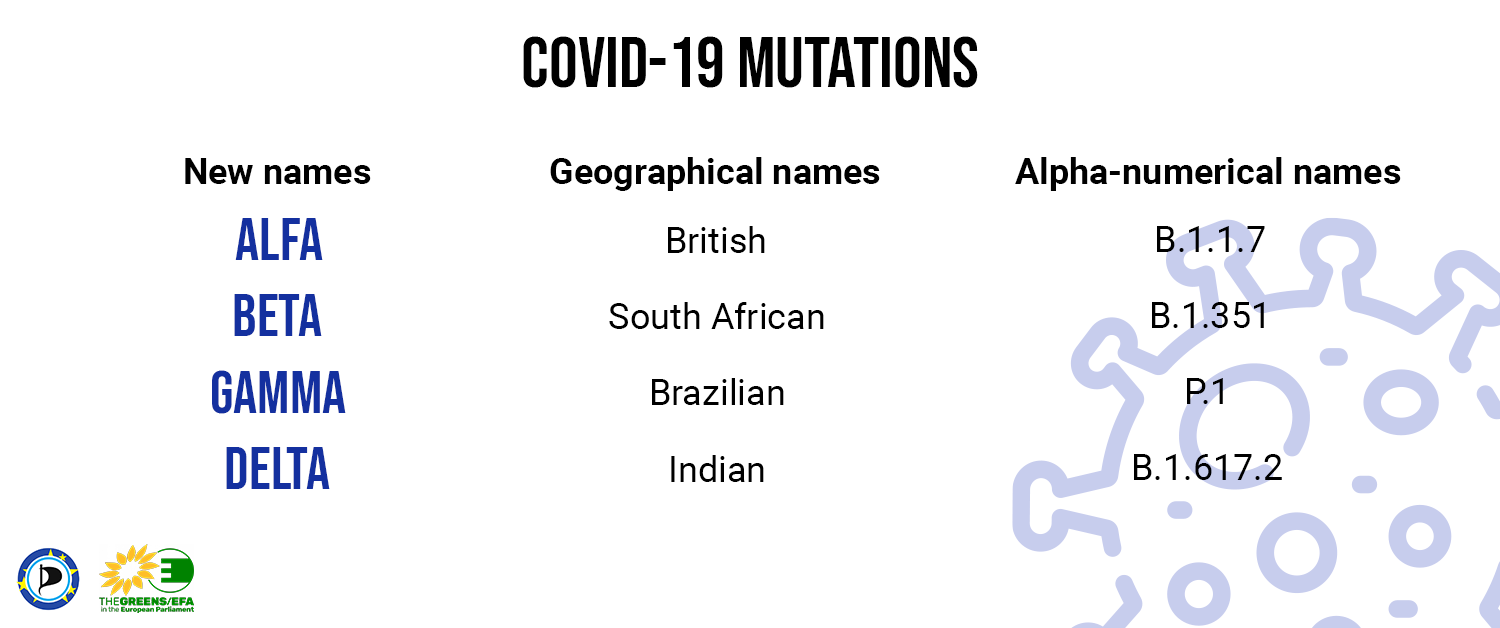
HOW EFFICIENT ARE THE VACCINES AGAINST VARIOUS MUTATIONS?
Mutations are a cause for concerns not only for doctors, but also for vaccine producers. If the virus makes too much of a “jump”, vaccines may stop being effective against it. Our fight against the pandemic therefore has two powerful weapons: genetics and virus sequencing, a process which allows scientists to “read” the whole genetic code of the virus and thus find any new, potentially dangerous changes in its structure. Virus sequencing also happens in the Czech Republic, but not on a large enough scale.
When a new coronavirus mutation is uncovered, it is important to see the efficacy of each vaccine against it.
How does efficacy look a few months after the onset of the vaccination?
The most important thing should be mentioned without we start making any lists. All EMA-approved vaccines protect you from a severe disease and death and, to a very high degree, also from the most aggressive mutations. While a few weeks after the first dose, you already are protected to a certain degree, full protection only kicks in after the second dose (this naturally doesn’t apply to the one-dose Janssen vaccine). The vaccine efficacy against new coronavirus variants has become the subject of a number of studies. I mainly draw my data from here and this study.
Let’s take a closer look at each vaccine. We follow three parameters: full protection against disease (you don’t get infected at all), protection against severe disease, and protection against individual mutations, if the data is available. I will also note that protection against variants means full protection against symptomatic disease. Lab data and real figures show that vaccines can prevent a severe disease, almost 100%, even if you do get infected with one of the mutations.
1. Pfizer BioNTech (the Comirnaty vaccine)
The vaccine’s efficacy is around 95% when it comes both to full protection against the disease and protection against severe symptoms. This means that if you do get infected, it is highly likely you will experience very mild symptoms.
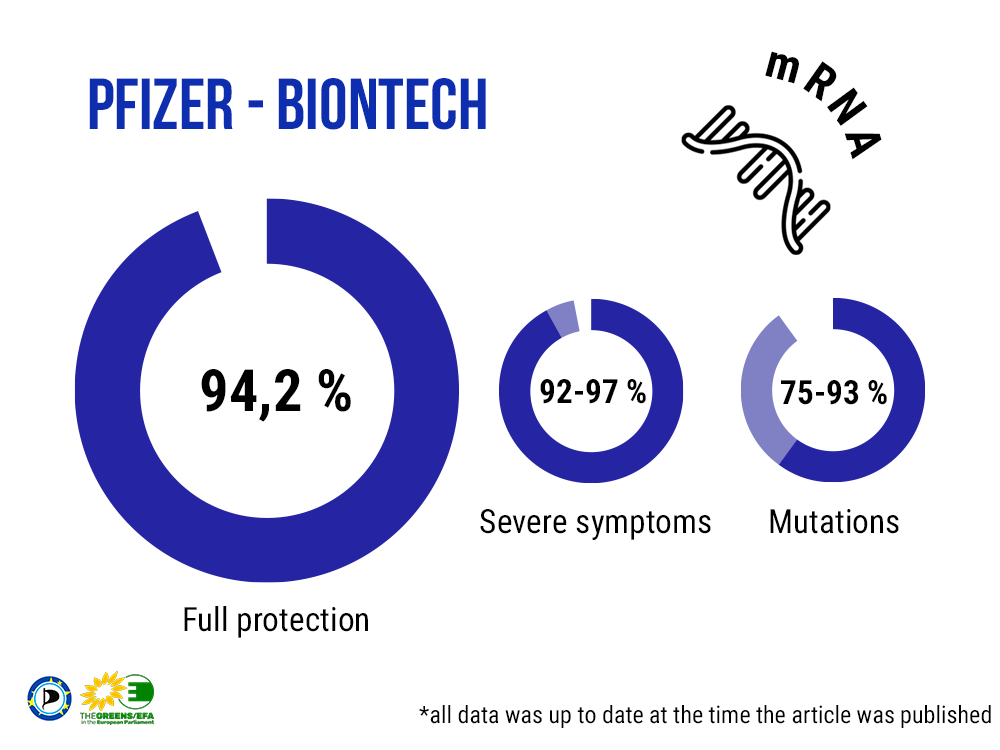
2. Moderna
This vaccine is second in terms of the number of administered doses in the Czech Republic and its efficacy in preventing severe symptoms is up to 100% – that is truly excellent news. The efficacy for full protection against infection is 94.5% for the original Covid variant. WHO data shows that the vaccine efficacy is not affected by new variants and the company has also been developing vaccine versions that are more effective against specific variants. This could help get the pandemic under control especially in countries where the given variants are predominant.
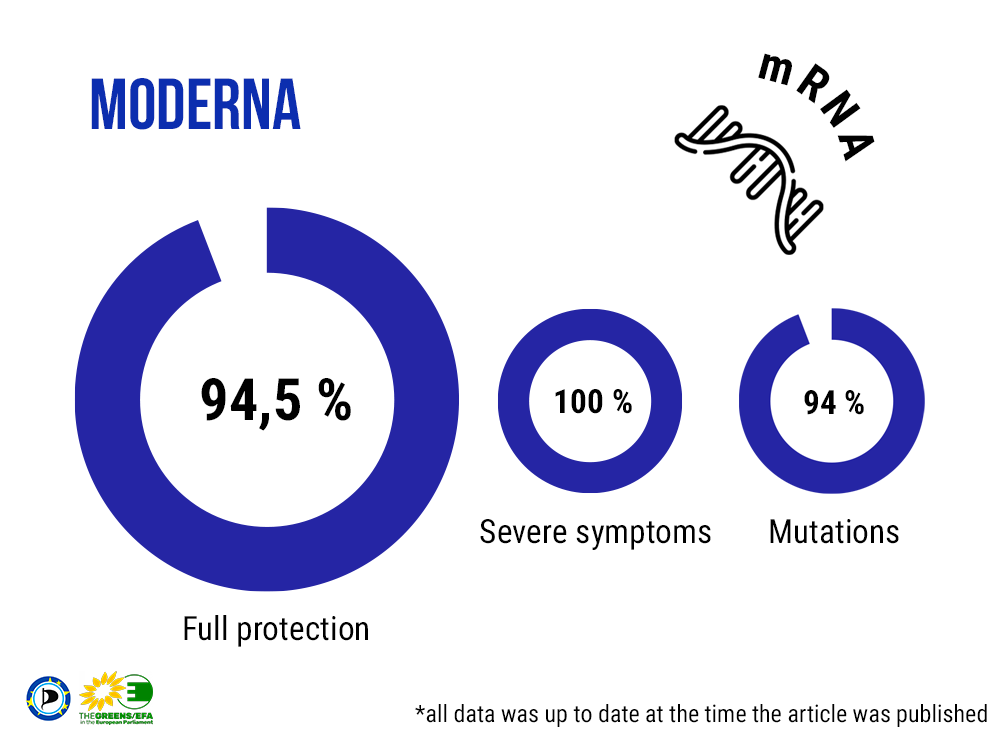
3. Astra Zeneca
Studies show that the Astra Zeneca vaccine is 100% effective in preventing severe symptoms. It contains the full genetic information of the coronavirus – the advantage is that different immune cells react to different part of the coronavirus. This means the vaccine is likely to be highly effective against the various mutations. Incomplete data from studies on a small sample of patients suggest that the vaccine is likely to be 60-70% effective when it comes to full protection against coronavirus variants.
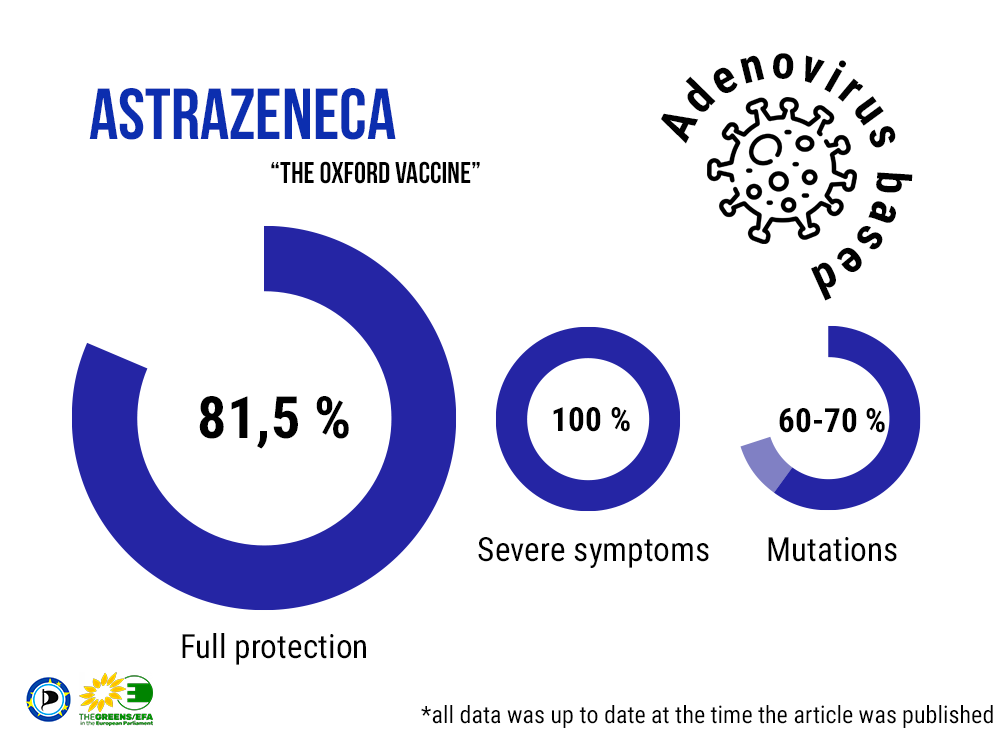
4. Janssen (Johnson&Johnson)
The only currently available one-dose vaccine is mostly administered by general practitioners in the Czech Republic. Its most significant feature is that the clinical trials took place mainly in Brazil and South Africa, at a time when coronavirus mutations were already spreading through both countries.
Its high efficacy against severe symptoms and in terms of full protection against the disease therefore gives hope that the vaccine will protect against the known coronavirus variants as well.
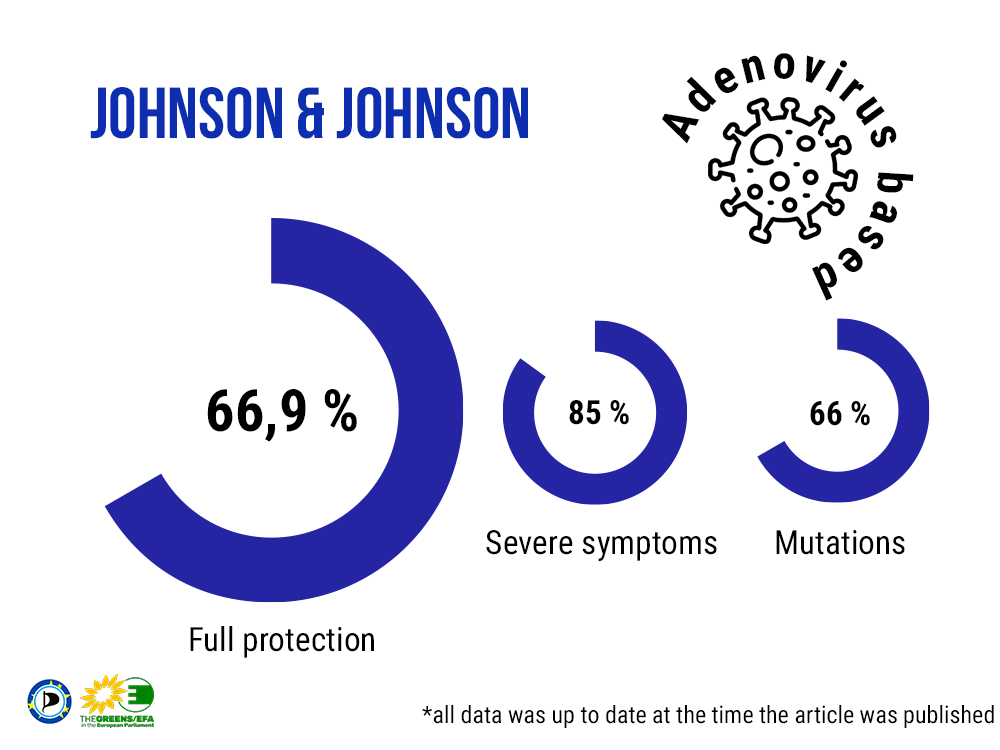
5. Novavax
Novavax is another vaccine that is reliably able to prevent severe symptoms and very effective in terms of fully protecting against the disease.
Since the clinical trials took place in England and South Africa at a time when various coronavirus mutations were prevalent there, studies state that it is effective against these mutations. You can find a more in-depth analysis of the results here.
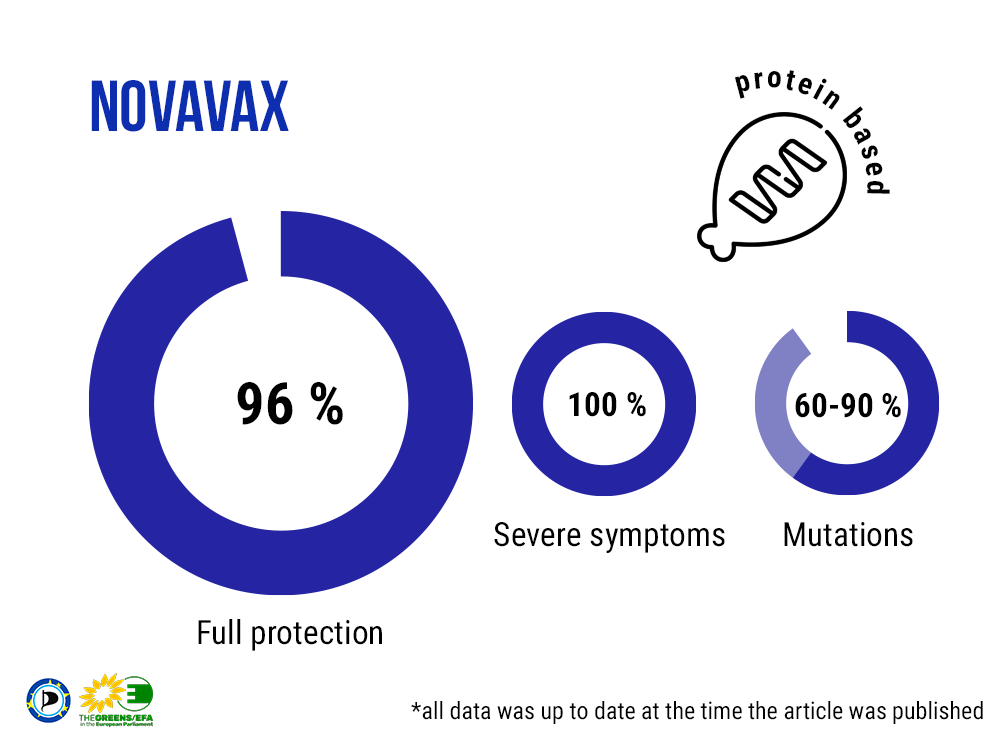
WHAT DOES THIS MEAN FOR ME SPECIFICALLY?
The good news for Czech citizens is that the Comirnaty vaccine by Pfizer BioNTech is highly effective against various new Covid variants. The majority of the doses administered in Czechia were of this vaccine. At this point, the company can meet the contracted supply and the vaccine is mainly distributed to large-capacity vaccination centres. Literally all of the available vaccines, however, offer a very high degree of protection and if we achieve a sufficiently high vaccination rate, we will gain respite from the coronavirus. If you can, please get vaccinated. I have been vaccinated last Friday. The fact that we have sufficient numbers of vaccines available is a great success of science and collaboration.
The high efficacy of other vaccine also gives hope that it will hopefully be possible to get the vaccine under control in Africa, for example, which has suffered from vaccine shortages in the last months. Sadly, I have to end my article on a sad note. While the situation has been getting under control in Europe and the USA, the rest of the world does not have enough vaccines and the death rate is quickly rising. It is crucial that we change that as fast as possible. It is in our interests in two different ways: Firstly, letting tens of thousands of people die while we have the solution is horrible from a human point of view. Secondly, if we let the virus rage on and mutate freely, a new variant that the current vaccines cannot handle is inevitable. Let’s do everything in our power to avoid that.

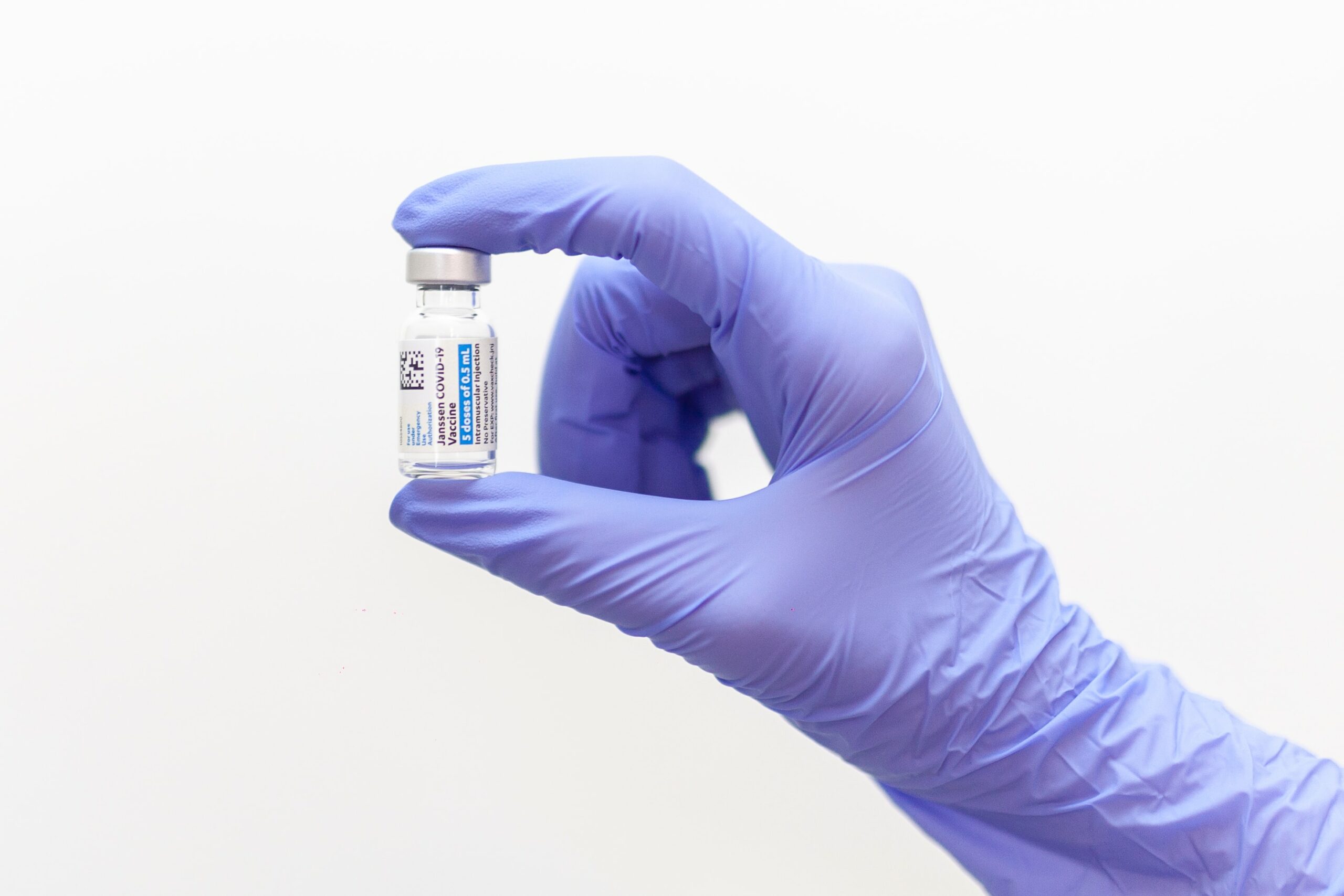
0 comments on “Coronavirus Special: Vaccination vs. Mutation”